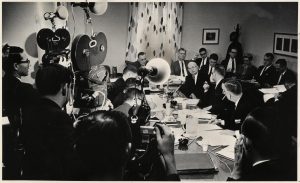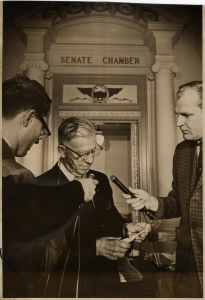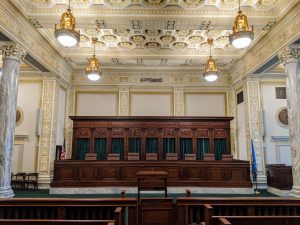Oklahoma Bar Journal
From the Ashes of Scandal Came Court Reform
By Bob Burke

This photograph accompanied a story about the scandal in The Daily Oklahoman newspaper. “Tense hearing before the Special House of Representatives Investigating Committee Wednesday saw Justice Earl Welch (in center wearing glasses and facing camera) before a battery of cameras and reporters at the capitol as he answered questions concerning allegations of bribery of members of the state supreme court.” Courtesy Oklahoma Historical Society.
Oklahomans were embarrassed and humiliated by a court scandal in the 1960s when three justices of the Supreme Court of Oklahoma were forced out of office and disgraced.
It was a dark day for the state on Jan. 21, 1965, when young state Rep. G.T. Blankenship, R-Oklahoma City, asked to speak to his fellow House members about “something of great concern.” Blankenship read a summary of a sworn statement given six weeks before by 80-year-old former Supreme Court Justice N.S. Corn, who was serving a federal prison term for income tax evasion.[1]
An uneasy quietness settled over the House chamber as Blankenship described Corn’s admission that he, as a justice of the Supreme Court, and two other justices had taken bribes for 25 years to rig votes on cases on appeal. In a 1957 case, Corn took $150,000, paid in $100 bills, to influence the Supreme Court’s decision in Selected Investments Corp. v. Oklahoma Tax Commission.[2] Corn revealed he paid Justices Earl Welch and Napoleon Bonaparte Johnson $7,500 each to help him form a majority. As Blankenship continued, House Speaker J.D. McCarty, a powerful Democratic leader, was visibly shaken. The conscience of leaders in the state Capitol and the citizens was shocked.[3]
How Blankenship received the sworn statement of former Justice Corn is like a tangled TV mystery. In January 1965, U.S. District Judge Stephen S. Chandler made a surprise visit to the home of Supreme Court Justice William A. Berry and handed him a copy of Corn’s statement, calling it, “Corn’s confession.”[4] Judge Chandler never told even his closest friends who gave him a copy of Corn’s statement, but as a federal judge, he was aware of the federal grand jury investigation of justices for income tax evasion. Chandler also worked in the federal courthouse with the court reporter who took the sworn statement.[5]
Justice Berry felt sick to his stomach as he read the confession of his former colleague. He said, “Described here were the actions of three justices, impugning the integrity of the whole court, and violating the very canons of truth and fairness.” Corn admitted there was never a year in his 25 years on the court when he did not take a bribe.[6]
MAKING THE ALLEGATIONS PUBLIC
Justice Berry knew the bribery accusations must be made public, but his lawyer friends who would share his disgust with the situation would not want to make the charges public for fear that powerful attorneys implicated by Corn’s statement would immediately sue them. Berry had a brilliant idea. He was aware that members of the state Legislature were immune from slander lawsuits for statements made during a legislative session. He set up a secret meeting with Rep. Blankenship who copied excerpts from Corn’s statement onto a legal pad.
Even though Rep. Blankenship’s wife was opposed to the move, he later said, “One of the reasons you run for public office is to perform a service that needs to be accomplished. I can’t run from this.”[7]
There was a statewide uproar after Rep. Blankenship made former Justice Corn’s confession public. Gov. Henry Bellmon was concerned about Rep. Blankenship’s safety because the veracity of powerful people was questioned.[8] The Oklahoma Bar Association created a special investigating committee that recommended filing charges against Justices Welch and Johnson. The committee cleared other sitting justices of any wrongdoing.[9]
The scandal had a depressing effect on the judiciary and the practice of law in Oklahoma. Time magazine called the scandal one of the worst in American history and referred to the quality of justice in Oklahoma as “the best money can buy.” Against the backdrop of corruption, Gov. Bellmon insisted that the Legislature pass sweeping justice reform measures. But Democratic leaders such as House Speaker J.D. McCarty killed any meaningful judicial reform bills.[10]
A federal grand jury in Oklahoma City indicted Justices Corn and Welch and prominent attorney and former Oklahoma City Mayor O.A. Cargill Sr. One count accused Cargill of orchestrating the payment of at least $1,000 to certain justices as a campaign contribution in exchange for the justices’ agreement to vote in favor of cases in which Cargill was interested.
Ultimately, Cargill was convicted on three counts of perjury. Two counts were dismissed by the U.S. Court of Appeals for the 10th Circuit, but one conviction was affirmed.[11]
Meanwhile, a special investigating committee of the Oklahoma House of Representatives filed articles of impeachment against Justices Welch and Johnson on March 18, 1965. Justice Welch, the longest-serving justice, immediately resigned. Justice Johnson was defiant and would not resign. The full House approved the articles of impeachment. Young state Rep. Larry Derryberry, later the state’s attorney general, said Johnson was a traitor to the judiciary, the profession and the people of Oklahoma.[12] Two days later, an Oklahoma County grand jury indicted Johnson on bribery charges.[13]
Otis Sullivant, a legendary reporter for The Daily Oklahoman, summarized the sentiment of most Oklahomans:
It has been a dark week for Oklahoma and its reputation nationally in government and politics. The state hasn’t received so much bad publicity in such a short time since the swashbuckling politics of the 1920s when our state was looked upon as a raw young one, still in its growing pains.
It has been quite a shock for those observers who assumed we had matured politically and were becoming settled in our political ways.[14]
AN IMPEACHMENT TRIAL

Oklahoma Supreme Court Justice N.B. Johnson speaks to reporters on May 13, 1965, immediately after the state Senate convicted him of bribery charges. He is the only Supreme Court justice in the history of Oklahoma to be impeached and convicted. Courtesy Oklahoma Historical Society.
The Oklahoma Constitution provides that the state Senate act as the trial court after the House brings charges by impeachment. Justice Johnson’s trial captured the attention of newspapers across the country. The New York Times sent a reporter to cover the trial. The charge of racism was raised: Johnson was part Cherokee, and it was suggested that former Justice Corn implicated Johnson because he was a Native American. The Times reporter wrote, “Justice Napoleon Bonaparte Johnson suggested today that anti-Indian prejudice might account for bribery charges against him.”[15]
Johnson’s trial in the state Senate was intense as witnesses for and against the justice appeared. Former Justice Corn spent two days on the witness stand, vigorously questioned by Sen. Roy Granthan of Ponca City, designated as the prosecutor for the trial. Reporter Bob McMillan of the Oklahoma City Times wrote:
Stripped of all but his dignity and never wavering in his testimony, ... Corn looked downward on the senate court of impeachment like a judge from the bench ... One could almost visualize the former justice still in his office as he casually said he took a $150,000 bribe and gave part to his colleagues but kept the lion’s share for himself.[16]
Justice Johnson took the stand in his own defense. He could not answer senators’ questions about why he deposited $20,000 more than his Supreme Court salary in a four-year period. He admitted to having a safety deposit box where he kept cash and occasionally used the cash to buy a cashier’s check to deposit in his bank in Claremore.[17]
In the end, Johnson was convicted by a single vote. He was the first and only Supreme Court justice in the history of Oklahoma to be removed from office by impeachment. Justice Berry sat through the trial and observed, “There were no slaps on the back or victorious cheers. It was a sad day for Oklahoma.”[18]
An article in Newsweek magazine labeled Oklahoma’s judicial system “Cash-and-Carry Justice.” Other articles in the Wall Street Journal and Reader’s Digest painted the picture of a state with a tainted appellate court that thrived on bribery.[19]
The admission by former Justice Corn could have created chaos by opening the floodgates to a torrent of appeals from disgruntled losers involving cases decided by Corn, Welch and Johnson. However, the U.S. Supreme Court refused to hear a case in which Justice Johnson wrote an opinion before he was impeached and removed from office. Instead, only a case-by-case analysis was allowed, and there must be evidence of corruption. Ultimately, only a handful of decisions in individual cases were vacated.[20]
The Legislature continued to drag its feet while Gov. Bellmon appointed OU College of Law Dean Earl Sneed to head an 18-person committee to make recommendations for judicial reform. Sneed began to shape public opinion about abolishing the election of appellate judges. He said, “Money given either to an aspiring or incumbent judge can create an obligation, or, even worse, constitute a direct or indirect bribe.”[21]
State Rep. Ralph Thompson, R-Oklahoma City, was chosen to draft language for a constitutional amendment that would eliminate the scandal-ridden justice of the peace system. Thompson later reflected, “Legislators who opposed change not only saw the light but felt the heat.”[22]
A FRESH INTEREST IN REFORM
The political landscape and likelihood of reforming the court system drastically changed after the general election in 1966. House Speaker J.D. McCarty was upset by funeral home operator Vondel L. Smith. McCarty was convicted of income tax evasion and sentenced to prison. Newly elected Gov. Dewey Bartlett committed his full support to court reform. On May 3, 1966, voters approved the first part of a comprehensive reform of the judicial system, the creation of a Court on the Judiciary to handle complaints against judges.[23]
Two state questions were approved by voters on July 11, 1967. The justice of the peace system was abolished. County and special courts were abolished. Trials would be handled by district courts; civil appeals would go to the Supreme Court and criminal law appeals would be heard by the Criminal Court of Appeals, now named the Court of Criminal Appeals. Politics was taken out of the state’s two highest appellate courts. Supreme Court justices and Court of Criminal Appeals judges would be appointed by the governor from names submitted by a Judicial Nominating Commission (JNC). Every six years, the justice or judge would run for retention without an opponent.[24]

The Supreme Court historically convened in the courtroom at the Oklahoma State Capitol. Courtesy OSCN.
The Legislature took much of the 1968 session to institute a new judicial system. The changes took effect Jan. 13, 1969. The district courts were organized based on judicial districts rather than counties. The old superior court judges became district judges, and common pleas, county, children’s and juvenile court judges became associate district judges. A unified court system was created under the supervision of the Supreme Court. OU College of Law professor George B. Fraser, a consultant to the Legislature, said, “For the first time, the Supreme Court, rather than the Legislature, had the authority to prescribe any rule and take any action that will improve and facilitate the administration of justice in Oklahoma.”[25]
To administer the court system, the constitutional amendments created the administrative director of the courts to serve at the pleasure of the chief justice. Future Justice Marian Opala was chosen by the chief justice as the first “state court administrator.” Opala likened his role as the executive director of a corporation’s Board of Directors, made up of the nine members of the state’s highest court.[26]
The new Judicial Article 7 of the state constitution authorized the Legislature to create intermediate appellate courts. The Oklahoma Court of Appeals, now the Oklahoma
Court of Civil Appeals, was created Jan. 1, 1971. Other reforms included district court judges being elected on a nonpartisan ballot for a four-year term. The JNC would screen applications for vacancies on any court of record. The governor was given three names from which to choose. If the governor fails to appoint a nominee to a position within 60 days, the chief justice makes the selection.[27]
Court reform proposals approved by voters more than a half-century ago have worked well. No scandal has touched members of the state’s highest courts. The judges selected, from district judges to Supreme Court justices, have furthered the goal of judicial independence. Since we converted to a nonpartisan, merit-selection Judicial Nominating Commission system, more than 300 trial and appellate judges have been appointed. The judiciary has proved it can manage its own house. Several judges have resigned when requested to do so, and one judge was removed from office because of mental issues.[28]
WHERE ARE WE NOW?
Since 2013, the Legislature has challenged the JNC with an apparent goal of a governor being allowed to appoint judges without any formal prescreening, which is now accomplished by the JNC with an in-person interview and an Oklahoma State Bureau of Investigation background check of applicants for judicial positions.[29]
One of the fiercest attacks against our time-tested system of judicial independence came in 2022 in the form of Senate Joint Resolution 43. The resolution was a menagerie of ideas. The governor could appoint judges without any vetting. In a return to the old guard Democratic system before court reform, district judges would run for office on a partisan basis and could actively ask for money. All appellate judges’ terms would end at the conclusion of their current term. The Legislature would control the practice of law and license lawyers in two categories: those who appear in court and those who work primarily in their office. Gone would be the active part the Oklahoma Bar Association plays in disciplining lawyers who violate the Code of Professional Conduct.[30]
SJR 43 easily passed the state Senate but ran into opposition in the House of Representatives, where it failed by a single vote to be signed out of a committee to be considered by the full House.
Former District Judge Bland of Pittsburg County offered a stark perspective of the effects of SJR 43 or similar legislation. Judge Bland served 22 years on the district court bench before becoming chairman of the JNC. When the Oklahoma Council of Public Affairs alleged that the JNC was a secret process in which politics reigned, Judge Bland said:
We don’t discuss the vote after the interviews. It’s in the rules that one commissioner does not lobby another commissioner on how to vote. It’s just about everybody reviewing the information, studying the background checks, doing their research, listening to the interviews, and then voting.
A common criticism of the JNC process is that “lawyers control the JNC and therefore choose the judges.” That is a myth. Lawyers are in a minority on the JNC. Nine of the 15 members of the JNC are nonlawyers. The governor appoints six members, and none can have a lawyer in their immediate family. Of the three remaining nonlawyer members, one is appointed by the House speaker, one is elected by the Senate president pro tempore, and one is selected by members of the JNC. Only six members are lawyers – one selected by other lawyers from each of the old six congressional districts.[31]
Retired Oklahoma Supreme Court Justice Steven Taylor is a champion of judicial independence, free from politics. He wrote:
Political winds from both the left and the right continue to attempt to weaken judicial independence. Political winds should never blow in a Courtroom. The Judge should never hold up a finger to test political winds. It is absolutely essential that every judge have the courage to follow the law even when it is unpopular to do so. ...
Every Patriot in Oklahoma should be championing this judicial process that has been our heritage from our founding and has been preserved with bloodshed on the battlefield countless times in our history.[32]
An independent judiciary is vital to Oklahoma. Attempts to get rid of the Judicial Nominating Commission could arguably be viewed as a power grab to allow political leaders to appoint judges without any formal vetting of applicants. That is a sure way to return to the sordid history of the first half of our state history when politics determined what judges were appointed or elected. Merit had little to do with it.
All citizens involved in a dispute deserve an unbiased judge to hear the facts and apply the law without showing favoritism to any party. We all want a level playing field when involved in a lawsuit. We should learn from the mistakes of the past and allow the court reform of the 1960s to continue to guarantee judicial independence.
 ABOUT THE AUTHOR
ABOUT THE AUTHOR
Bob Burke has been a workers' compensation and constitutional lawyer for 42 years. He is vice chair of the Oklahoma Supreme Court Committee on Judicial Elections and a Trustee of the Oklahoma Bar Foundation. Mr. Burke is a member of the Oklahoma Hall of Fame and has written more historical nonfiction books (154) than anyone in history.
ENDNOTES
[1] Interview with G.T. Blankenship, Feb. 20, 2002, Heritage Archives, Oklahoma Hall of Fame, hereafter referred to as the G.T. Blankenship interview. The only known copy of the sworn statement was delivered to me in 1996 by OBA Executive Director Marvin Emerson. He told me, “You will need this someday to show future generations how bad the scandal was.” Marvin died two years later. The sworn statement is hereafter referred to as Corn Statement.
[2] 1957 OK 53, 309 P.2d 267.
[3] Corn Statement; In 2015, James Harrod, the county attorney of Oklahoma County who took the sworn statement in a Missouri prison where former Justice Corn was serving his sentence for income tax evasion, saw the sworn statement for the first time. He left office a few weeks after taking the sworn statement and never saw the transcript until I presented him a copy. He read the sworn statement and confirmed its authenticity.
[4] William A. Berry and James Edwin Alexander, Justice for Sale: The Shocking Scandal of the Oklahoma Supreme Court, (Oklahoma City: Macedon Production Company, 1996), hereafter referred to as Justice for Sale.
[5] Bob Burke, An Independent Judiciary is Good for Oklahoma Business, (Oklahoma City: Commonwealth Press, 2022), hereafter referred to as An Independent Judiciary, p. 17.
[6] Justice for Sale, p. 113.
[7] An Independent Judiciary, p. 43.
[8] Id.
[9] Id., p. 38.
[10] Id. p. 48-49; Time magazine, April 16, 1965.
[11] The Oklahoman, June 17, 1965; Cargill v. United States, 381 F.2d 849 (10th Cir. 1967).
[12] An Independent Judiciary, p. 43.
[13] Id.
[14] Id., p. 45.
[15] Id., p. 51.
[16] Oklahoma City Times, May 7, 1965.
[17] Justice for Sale, p. 106.
[18] An Independent Judiciary, p. 52.
[19] Id., p. 56-57.
[20] Justice for Sale, 179-183.
[21] An Independent Judiciary, p. 57.
[22] Bob Burke and Eric Dabney, Gentleman Jurist: The Life of Ralph G. Thompson, (Oklahoma City: Oklahoma Heritage Association, 2011); Recollections of Ralph Gordon Thompson recorded during the winter and spring of 2010, Archives, Oklahoma Hall of Fame, formerly the Oklahoma Heritage Association, hereafter referred to as Ralph Thompson interview.
[23] The Daily Oklahoman, May 4, 1966; An Independent Judiciary, p. 60-61.
[24] State Questions 447 and 448 were approved by state voters. Court reform passed handily in Oklahoma and Tulsa counties, but voters in rural areas generally voted against reform; Ralph Thompson interview.
[25] An Independent Judiciary, p. 66-67.
[26] Id., p. 67.
[27] Id., p. 68.
[28] Id., p. 89.
[29] Id.
[30] Senate Joint Resolution 43, Oklahoma Legislature, 2022.
[31] An Independent Judiciary, p. 71.
[32] Id., p. 99.
Originally published in the Oklahoma Bar Journal – OBJ 94 Vol 5 (May 2023)
Statements or opinions expressed in the Oklahoma Bar Journal are those of the authors and do not necessarily reflect those of the Oklahoma Bar Association, its officers, Board of Governors, Board of Editors or staff.
